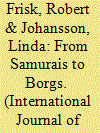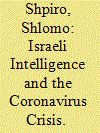|
|
|
Sort Order |
|
|
|
Items / Page
|
|
|
|
|
|
|
| Srl | Item |
| 1 |
ID:
179139


|
|
|
|
|
| Summary/Abstract |
The first ten years of Soviet espionage in the United States may be defined as the period from 1924 to 1933, a decade bookended by two milestones: namely, the establishment of Amtorg in 1924 and U.S. diplomatic recognition of the Soviet Union in l933. Soon after defeating the Whites and other counterrevolutionaries and consolidating their newly won power, the Bolshevik government looked toward other countries, not only to advance the international communist revolution, but to access open-source and secret information that would accelerate Russia’s transformation from an agrarian society to a military and industrial powerhouse. By the early twenties, major European cities already contained Soviet intelligence centers concealed in embassies, consulates, and trade missions. Soviet interest in the United States soon followed. As a legitimate exporter of goods to Russia, the Amtorg Trading Company focused the center of Soviet intelligence activity in New York. According to a Federal Bureau of Investigation (FBI) report, Amtorg provided “the first broad ‘legal’ base for Soviet Intelligence operations in the United States…” Yet, years later, when Congress finally turned toward Armtorg, its investigation targeted the spread of communism while completely ignoring the Soviet Union’s wholesale theft of American military and industrial secrets.
|
|
|
|
|
|
|
|
|
|
|
|
|
|
|
|
| 2 |
ID:
179142


|
|
|
|
|
| Summary/Abstract |
A successful strategic surprise, whether in the military or business sector, can have critical significance both for the initiating organization (the “attacker”) and the organization under attack (“the victim”). In the military sector, the attack can disrupt the victim’s strategic organization, inflict untold damage, foil its ability to protect itself and to react, and even determine the outcome of the battle. For example, the sudden strike that the Germans unleashed on the USSR in Operation Barbarossa (1941) disrupted the USSR’s defense systems, dealt the Russian soldiers a fatal blow, and greatly expedited Germany’s huge land invasion of the USSR. It took the USSR two to three years to recover and rebuild to the level where it could challenge the German powerhouse. The attack on Pearl Harbor in 1941 had the same destructive effect on U.S. forces in a single day.
|
|
|
|
|
|
|
|
|
|
|
|
|
|
|
|
| 3 |
ID:
179140


|
|
|
|
|
| Summary/Abstract |
The current debate on intelligence ethics is internally inconsistent and suffers from at least three problematic issues. First, there is no academic consensus regarding the definition of intelligence—for instance, on whether covert operations should be included in the description of intelligence, which is relevant for discussing intelligence ethics.1 We will not immerse ourselves in the definition of intelligence, but simply include covert operations in intelligence ethics to cover as many aspects as possible. Second, it is common to view intelligence ethics as an oxymoron.2 Viewing a term as an oxymoron means viewing the term as consisting of two contradictory parts like found missing or misunderstood. If one considers intelligence ethics to be an oxymoron, then discussing whether and how intelligence activities can or should be ethical is irrelevant. The proponents of this view often claim that ethical considerations hamper the conduct of, for example, National Security Intelligence (NSI). The reason for this is the belief that ethical considerations would make intelligence agencies less effective, or even prohibit proper and essential NSI operations, covert or not.
|
|
|
|
|
|
|
|
|
|
|
|
|
|
|
|
| 4 |
ID:
179141


|
|
|
|
|
| Summary/Abstract |
Several times a year, crowds gather at the Hazratbal Shrine near Srinagar to see the imam display a thermometer-like container that purportedly holds Prophet Muhammad’s hair.1 Located close to the summer capital in Jammu and Kashmir, the shrine–mosque complex is a symbol of prestige and famous throughout India. More than that, it has also repeatedly been the site of violent disturbances connected to militants seeking independence from India.2 One of the most tantalizing events surrounding the shrine is a little investigated, but widely retold story about the hair being stolen and returned during the early 1960s. The narrative about the theft from India’s top intelligence officer has been repeated but has not been previously examined from an intelligence studies lens. This article calls for a rethinking of the story and demonstrates how a careful reading of an intelligence officer’s memoir can potentially reveal new facts in light of fictional material.
|
|
|
|
|
|
|
|
|
|
|
|
|
|
|
|
| 5 |
ID:
179137


|
|
|
|
|
| Summary/Abstract |
The outbreak of the coronavirus crisis in Europe and the Middle East, in March 2020, caught the Israeli government and health authorities by surprise, unprepared for the scale and gravity of the incoming pandemic. In its efforts to provide fast and effective crisis management, and faced with a rapidly growing number of people infected with the coronavirus, the Israeli government turned to its Intelligence Community. Israel’s IC has a strong and long tradition as a key element within the structure of the state, and although ordinarily engaged in security and counterterrorism tasks, it was able to quickly adapt its considerable capacities to make a substantial contribution in the fight against the coronavirus.
|
|
|
|
|
|
|
|
|
|
|
|
|
|
|
|
| 6 |
ID:
179144


|
|
|
|
|
| Summary/Abstract |
Intelligence has been historically seen as a national-level function, carried out primarily by the federal government. Although local law enforcement agencies have often conducted intelligence activities, these have usually focused on criminal prosecution, leaving to the national level the task of using intelligence to proactively counter national security threats. The U.S. Intelligence Community, for an example, is an exclusively federal-level entity, and the literature on American intelligence tends to focus on national-level organizations such as the Central Intelligence Agency and the Office of the Director of National Intelligence.1 Since the 11 September 2001 (9/11) attacks, however, there has been significant effort in the United States to share intelligence with state and local officials, and to a lesser extent, to create new local intelligence structures and organizations. This has resulted in what might be called the “localization of intelligence,”2 and although civil liberties advocates worry about the possible erosion of liberty and privacy that such efforts may produce, many scholars and law enforcement experts argue that this increased focus on local intelligence has been a positive development. Little research has been done, however, to examine the results of such local intelligence programs.
|
|
|
|
|
|
|
|
|
|
|
|
|
|
|
|
| 7 |
ID:
179145


|
|
|
|
|
| Summary/Abstract |
The British Foreign Office Information Research Department (IRD) was established in 1948 to counter Cold War-era disinformation promulgated by the Soviet Union.1 The Future Foreign Publicity Policy cabinet memorandum, which established the IRD, stated that the department would be a “small Section in the Foreign Office to collect information concerning Communist policy, tactics and propaganda and to provide material for our anti-Communist publicity….”2 However, the memorandum’s authors failed to anticipate the scale of specialized resources that would be needed to adequately fight communist disinformation worldwide. Not only would Sir Ralph Murray, first head of the IRD, need substantially more than a small staff; he would also require specialized skill sets that were not well represented in the diplomatic services and were difficult to recruit. Primarily, they recruited “authors and publishing houses to serve as conduits for non-attributable IRD ventures, and some of the most respected names amongst the British democratic left ended up authoring works quietly organized and funded by the IRD.”3 This was especially noteworthy in 1949, when the IRD attempted to dramatically scale up its operations by influencing British commercial publishing.
|
|
|
|
|
|
|
|
|
|
|
|
|
|
|
|
| 8 |
ID:
179138


|
|
|
|
|
| Summary/Abstract |
Behavioral economics, or “economics and psychology,” is an attempt to extend the explanatory power of economics by developing economic theory on more plausible psychological foundations.1 Most of its findings and applications pertain to decisionmaking under conditions of risk and uncertainty. There are two parts of the intelligence process to which an understanding of behavioral economics may be relevant: (1) the transactions and exchanges involved in agent recruitment and agent running, and (2) the task of prioritizing human intelligence (HUMINT) sources for interrogation. More generally, any prioritization task involving ranking or ordering is shaped systematically by the human decisionmaking process.
|
|
|
|
|
|
|
|
|
|
|
|
|
|
|
|
|
|
|
|
|